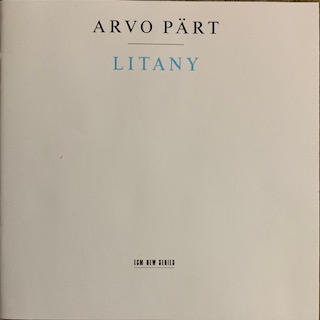“…It was July 25th, 1976. I was sitting in the [Pühtitsa] monastery’s yard on a bench, in the shadow of the bushes, with my notebook. ‘What are you doing; what are you writing there?’ The girl, who was around ten, asked me. ‘I’m trying to write music, but it’s not turning out well.’ I said. And then the unexpected words from her, ‘Have you thanked God for this failure already?’”1
During the Soviet control of Estonia, composer Arvo Pärt found himself at odds with Moscow numerous times. One of these occurred with the premiere of his 1968 work Credo, which contains the words (Latin), Credo in Jesum Christum—I believe in Jesus Christ. Consequently, Pärt was unofficially censured. “[T]he composition was hushed up and further performances were banned.”2
The middle section of Credo was structured “to imitate chaos and destruction”, in order to juxtapose an eye for an eye, a tooth for a tooth, with but I say to you, do not resist evil (Matt 5:38–39).3 As Pärt relates, this could have been interpreted as “the collapse of the Soviet regime”.4
Tensions increased to the point the composer realized it was becoming economically infeasible to continue in his profession while under Soviet rule.5 Shortly thereafter, a ‘recommendation’ prompted him to leave his homeland, as his wife, Nora recounts:
“A leading member of the Central Committee visited us at home in autumn 1979; he recommended that we leave the country. It was supposed to look like a voluntary decision—but in fact it was an expulsion which, at that time, was irreversible; we boarded the train to Vienna shortly afterwards.”6
Residing now in the West, freed from Soviet shackles, Pärt increasingly undergirded his works with Christian-themed texts. After the Soviet Union disintegrated, Pärt eventually returned to his homeland, Estonia.7
Born September 11, 1935 in Paide, Estonia to an Orthodox father and a Lutheran mother, Arvo Pärt was raised as a Protestant, though not especially religious as a youth.8 At conservatory, during his studies of Western composers, particularly their sacred texts, he was moved by the works’ spiritual nature. This, in turn, motivated him to pursue his own spirituality, to the extent it would inextricably intertwine with his music.9
Pärt formally converted to the Orthodox Church in 1972.10
Two album releases post-expulsion (and Soviet disintegration) are reviewed below:
Litany (ECM New Series 1592, BMG 78118-21592, © ECM Records, 1996)
Orient & Occident (ECM New Series 1795, Universal Classics 289 472 080, © ECM Records, 2002)
Litany consists of three pieces. The first (title piece Litany)  features the Tallinn Chamber Orchestra (Tõnu Kaljuste conducting), Estonian Philharmonic Chamber Choir, and the Hilliard Ensemble (vocal quartet). The second and third pieces are instrumental, featuring the Lithuanian Chamber Orchestra (Saulius Sondeckis conducting). Disappointingly, besides the text for the title piece, Litany, no explanatory liner notes are provided; so, information had to be obtained through other research.
features the Tallinn Chamber Orchestra (Tõnu Kaljuste conducting), Estonian Philharmonic Chamber Choir, and the Hilliard Ensemble (vocal quartet). The second and third pieces are instrumental, featuring the Lithuanian Chamber Orchestra (Saulius Sondeckis conducting). Disappointingly, besides the text for the title piece, Litany, no explanatory liner notes are provided; so, information had to be obtained through other research.
—Litany is set to the (King James) English text of 4th century theologian John Chrysostom’s hourly prayers—24, for each hour of the day. At nearly 23 minutes long, it comprises a bit over half the length of the entire disc. Each prayer begins with the vocative, “O, Lord…” Due to differing lengths, Pärt scored the music asymetrically, in order to match the specific pattern of each one.
It reaches its climax during the singing of the 24th. This prayer reads, O Lord, Thou knowest that Thou dost as Thou wilt, let then Thy will be done in me, a sinner, for blessed art Thou unto the ages. Amen. I find the 23rd the most poignant: O Lord, shelter me from certain men, from demons and passions, and from any other unbecoming thing. (Click on the hyperlinked title above [and those below] to listen to the entire piece.)
—Psalom (Slavonic, Psalm): The Slavonic text of Psalm 112 LXX (aka Septuagint) underlies this fully instrumental work. The Orthodox Psalter sources the Greek LXX (rather than the Hebrew Masoretic Text), so the equivalent text in typical Protestant versions is Psalm 113. Its words are exchanged for musical notation. Separating each verse-as-music are long pauses (rests), which provide space for reflection.
—Trisagion (Greek, Tri-Holy, Thrice Holy): “Although it is an instrumental piece, the parameters of this text in Church Slavonic (number of syllables per word, accentuations etc.) are the determining factor in the composition.”11 Part of Orthodox liturgy, the Trisagion text itself contains portions of Scripture, beginning with the Tri-aspect of Matthew 28:19, which is then followed by Luke 18:13 (be merciful to me, a sinner). Its middle reads, “O Holy God, Holy Strong, Holy Immortal, have mercy on us”, which is thrice recited. It concludes with ‘The Lord’s Prayer’, aka ‘Our Father’. In the score this text is written under the notes, in order to guide the musicians.12
All in all, I rate Litany a 4.5 out of 5. Well programmed, with Psalom providing a welcome break after the more demanding listen of the title piece and Trisagion fitting as a finale. Perhaps a good place for the Pärt novice to begin.
The Orient & Occident release consists of three pieces. All tracks feature the Swedish Radio Symphony Orchestra and the Swedish Radio Choir, with Tõnu Kaljuste conducting. At over 30 minutes, the five piece suite of the final work Como cierva sedienta constitutes two-thirds of the disc’s duration.
release consists of three pieces. All tracks feature the Swedish Radio Symphony Orchestra and the Swedish Radio Choir, with Tõnu Kaljuste conducting. At over 30 minutes, the five piece suite of the final work Como cierva sedienta constitutes two-thirds of the disc’s duration.
—Wallfahrtslied / Pilgrims’ Song: The version here is for men’s choir and string orchestra (2001). It was originally written (1984—for tenor or baritone voice and string orch) after the death of friend Grigori Kromanov, Estonian film and stage director. Pärt’s musical intent here is to bridge the chasm now forged between the two—between time and timelessness, temporality and eternality. The orchestra musically represents the time side; the men’s choir, the other. The text, sung in German, is Psalm 121 (LXX), which begins, “I will lift up mine eyes unto the hills…”
Orient & Occident (East & West): As Psalom and Trisagion in the earlier (above) release, the text here speaks through the music. The underlying words come from the Old Slavonic of the Niceno-Constantinopolitan Creed (381).13 This Creed is “among the few religious texts that are the same in the Western and Eastern Church.”14 The music is a commingling of Eastern and Western styles.15 The composition appears to reflect Pärt’s Christian ecumenism—a seeming desire that Christians be, perhaps, less sectarian.16
Como cierva sedienta (Spanish, like a thirsty deer): The text here is Psalms 42–43 (LXX), sung in Spanish, featuring Helena Olsson, soprano.
Why art thou cast down, O my soul?
And why art thou disquieted within me?
David’s refrain here is universal in appeal. We all feel this from time to time. “My soul” represents the soul of each of us. Yet, David’s solution to his plight is distinctive:
Hope thou in God:
For I shall yet praise Him
Given the length of Como cierva sedienta, Orient & Occident stands or falls on its relative merits. Candidly, much in the way I dislike sustained high register trumpeting, I do not much care for sustained high pitched soprano singing. It’s just a bit too much for these ears at times. But my assessment is, of course, subjective. You may quite like it. And that’s not to say the piece has no merits. It certainly does. That said, I still prefer the first two works, the first especially. Overall I’d rate this release a 4 out of 5.
______________________________________
1 Taken from Arvo Pärt’s commencement speech at St. Vladimir’s Orthodox Theological Seminary, May 31, 2014.
2 Arvo Pärt Centre > Timeline > 1968 > Premiere of Credo in November.
3 “I Seek a Common Denominator”, Italian musicologist Enzo Restagno’s interview with Nora and Arvo Pärt, 2010, as taken from Arvo Pärt Centre.
4 Ibid.
5 Ibid.
6 Ibid.
7 Peter C. Bouteneff, Arvo Pärt: Out of Silence (Yonkers, NY: St. Vladimir’s Seminary Press, 2015), p 51.
8 Bouteneff, Out of Silence, p 48.
9 Bouteneff, Out of Silence, pp 48–51.
10 Bouteneff, Out of Silence, p 48.
11 “Works: Trisagion”, as taken from the short description from Arvo Pärt Center site; see hyperlink at main text.
12 Text obtained from Universal Edition’s page for Trisagion, page 2.
13 See description under the hyperlink at the beginning of this paragraph.
14 Ibid.
15 Ibid.
16 These are my own thoughts, extrapolated from various sources. See, e.g., Bouteneff, Out of Silence, pp 50, 51–53; cf. source at footnote 3 above.
It's Appropriate To Share:
 features the Tallinn Chamber Orchestra (Tõnu Kaljuste conducting), Estonian Philharmonic Chamber Choir, and the Hilliard Ensemble (vocal quartet). The second and third pieces are instrumental, featuring the Lithuanian Chamber Orchestra (Saulius Sondeckis conducting). Disappointingly, besides the text for the title piece, Litany, no explanatory liner notes are provided; so, information had to be obtained through other research.
features the Tallinn Chamber Orchestra (Tõnu Kaljuste conducting), Estonian Philharmonic Chamber Choir, and the Hilliard Ensemble (vocal quartet). The second and third pieces are instrumental, featuring the Lithuanian Chamber Orchestra (Saulius Sondeckis conducting). Disappointingly, besides the text for the title piece, Litany, no explanatory liner notes are provided; so, information had to be obtained through other research. release consists of three pieces. All tracks feature the Swedish Radio Symphony Orchestra and the Swedish Radio Choir, with Tõnu Kaljuste conducting. At over 30 minutes, the five piece suite of the final work Como cierva sedienta constitutes two-thirds of the disc’s duration.
release consists of three pieces. All tracks feature the Swedish Radio Symphony Orchestra and the Swedish Radio Choir, with Tõnu Kaljuste conducting. At over 30 minutes, the five piece suite of the final work Como cierva sedienta constitutes two-thirds of the disc’s duration.
Recent Comments